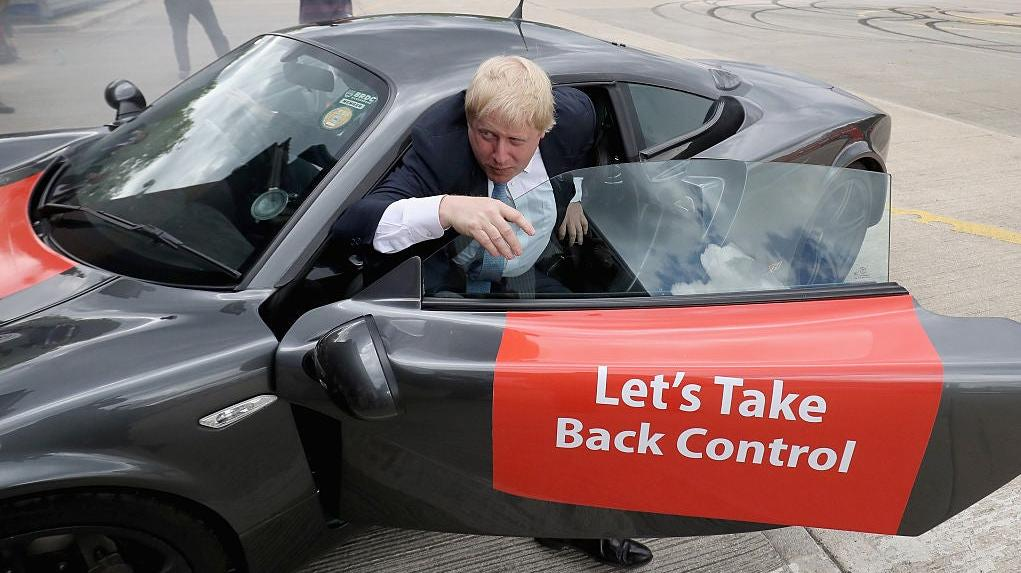Boris Johnson Was The Worst Car Writer Of All Time
Johnson's blundering career as a car reviewer previewed the mess he'd make as Britain's Prime Minister.
"It was as though the whole county of Hampshire was lying back and opening her well-bred legs," wrote Boris Johnson, dude who used to run London and now helped run the UK out of the EU about wheeling a Ferrari F430, "to be ravished by the Italian stallion."
And that's leaving out how he made his editors actually weep because he was such a dick to them, but I'm getting ahead of myself.
Editor's Note: This article was originally published on June 24, 2016, in the wake of the United Kingdom's decision to leave the European Union, a campaign spearheaded by Boris Johnson. With today's news that Johnson has resigned from his position as Prime Minister amid a vast and baffling series of scandals, we thought it was worth revisiting BoJo's blundering days as an automotive journalist.
Boris Johnson, the flop-haired ex-mayor of London, has been an outspoken supporter of Brexit, or however you call the thing where old scared racist people in the UK want to keep brown people out of their country and think that ditching the shitshow that is the EU is going to help them with that.
He even did burnouts in a British Ginetta with campaign slogans on it.

If you weren't aware, Boris made his name as a columnist before he got known as a politician, and he worked his way from political reporting into a couple cushy gigs as a car reviewer.
Reviewing cars is not only the easiest job in journalism, it's the one with the most conflicts of interest and possibly the most extravagant perks. I would say that Boris was perfect for the job, but man, this dude was just about the worst employee a newsroom could have.
This is all neatly pieced together by biographer Sonia Purnell in her 2011 book Just Boris. Sonia has a number of anecdotes about Boris as a writer, from his use of extremely British racist slurs for black and Chinese people, arguments that Africa would be better off under colonialism again, and some surprisingly backwards lines about the gay community.
There are notes on his contempt for his own job as a reporter, whom he referred to as "parasites," and his often-private, sometimes public sexism. "He also devoted almost an entire leaving speech for a departing female colleague to the proportions of her embonpoint," Purnell writes.
The quality of his writing was equally noxious.
The guy notoriously made up the tech details of the cars he drove, and what he wasn't fudging, he was filling with sexual overtones. He fantasized about the tits the navigation system's voice must have, and he wrote about getting passed on the road by women drivers and then "taking them from behind."
The line about the Ferrari F430 is really triumphantly bad writing, and I'm just going to relish in its awfulness one more time. "It was as though the whole county of Hampshire was lying back and opening her well-bred legs to be ravished by the Italian stallion."
Someone actually published that. My god.
He also wrote, more tongue-in-cheek, about driving a Murano "Tee-hee! What was it saying, with the plutocratic sneer of that gleaming grille? It was saying 'out of my way, small car driven by ordinary person on modest income. Make way for Murano!"' A Murano, man. Boris sucked.
Purnell also offers a truly a spectacular description in how he fucked up GQ's finances as well as the sanity of its editors.
His then editor at GQ, Dylan Jones, believes the column to be probably the most expensive in magazine history. Boris was certainly paid handsomely for his work but he would hugely increase the cost through majestic indifference to the normal rules of car use. He collected dozens of parking tickets and fines by casually double parking the cars outside the likes of New Scotland Yard of the Royal Festival Hall. Penalty notices were, in Boris's own words, 'building up like drifting snow on the windshield' and more than once an underling had to be dispatched to rescue the car from the pound.
Remember, this is for a dude talking about the towering stance of a mid-level Nissan.
Boris would never dream of paying these fines himself, of course. GQ paid up, one of the reasons why Jones recalls that Boris managed to reduce three managing editors to tears during his association with the magazine.
Another biographer, Andrew Gimson in his 2012 book Boris: The Rise of Boris Johnson also notes that he was not only spectacularly bad at writing about cars, he was catastrophically awful at driving them:
Ann Sindall, his secretary, said, "these car articles— so much work goes in to doing them. These guys at GQ deliver these cars. They leave them at his house and think he'll drive them to Henley. They get towed away and taken to the pound. I tell them they've got to get them from the pound. He came in once and said, 'I can't find the car.' I said, 'What colour was it?' He said, 'It's red or purple or green.'"
It goes without saying that his subordinates had to pay for his shit.
"Boris tended to miss the session at which he would have been shown by the delivery driver how to use the car. Sindall said: 'The thing is he's so busy sometimes I'll have Mary Wakefield outside the Spectator offices learning how to use the car. He'll ring me and ask, 'How do I use the door?'"
Wakefield confirmed this account: 'He called me all through Saturday to get me to talk him through it, because he hadn't concentrated and couldn't work out how to open the door from the inside. He must have been stuck inside it. You had to turn a little dial to open the door.'"
And if you think that Boris was just some lovable goofball, racking up massive bills on a corporate account and giving his coworkers a hard time, this dude helped plot how to get the shit beaten out of a journalist who'd discovered he was part of a reportedly massive fraud operation.
Purnell writes that in '93, he faked getting tied up, beaten, and robbed in a New York hotel room with a buddy, allegedly defrauding an insurance policy with Lloyd's of London for £1.8 million. A News of the World reporter hounded after the story. Boris' buddy decided to have the dude beaten up (something that ultimately never happened) and called Boris for the reporter's home address and phone number. The guy who had been paid to tie them up recorded the call, cooperated with the cops, and became chief prosecuting witness against Boris' buddy, who did indeed get convicted and jailed. Purnell chalks up Boris' lack of reprimand, either from the courts or from his bosses at the time, to basically playing the fool, Bumbling Boris, loyal to an old friend but not knowing anything.
When a cop leaked the tape in '95, Boris described the whole affair as "a bit of a joke."
Amazingly, he played it out well on TV and in print, sort of becoming "a 1930s upper-class twit," as Purnell describes. The idea of him as charming in his hopelessness kept up in print, particularly with deadlines.
Indeed, Boris became notorious for filing late—keeping section heads, sub-editors and even editors themselves tapping their fingers and counting the seconds before the presses had to start rolling. Charles Moore recounts how he would often phone his star at 5:30 p.m., half an hour before the deadline, to find out how he was getting on. Quite often , Boris would not have even started writing then. Or even know what he was going to write about. Each week Boris would apologize with humor and bravado, and so it would go on. I can't believe I've been so disgraceful again,' was a favorite apology. 'He would say sorry, admit he was wrong and make a self-deprecating joke. you felt unable to say any more because you didn't want to lose what you thought was his friendship,' recalls one of his 'handlers.'
What an asshole.
Purnell notes that even his strongest supporters eventually had enough, at one point replacing his column with another after he missed a deadline by hours. Sub-editors had young children waiting at home, the newspaper risked missing its slot on the presses.
"Boris went completely ape," recalls the long-suffering [Mark] Stanway, who was kept late in to the evening by Boris for years. "He phoned me, f-ing and ceding. I said it wasn't my decision. He came back ten minutes later full of apologies. But Boris has a ferocious temper—he is not a cuddly teddy bear all the time."
He was often absent, late, couldn't be found when he was needed to back up for someone or write following breaking news.
Purnell writes, "yet another former colleague, a very senior man who perhaps understandably wishes to remain anonymous, sums it up: 'There is an inverse relationship: the greater the proximity to Boris, the less you like him. If you just see him cracking jokes on Have I Got News For You, you think he's a great bloke. If you've worked with him or relied on him, it's a different matter.'"
